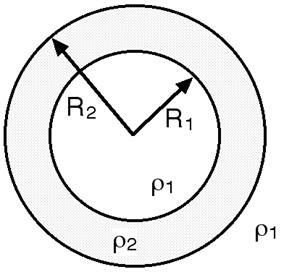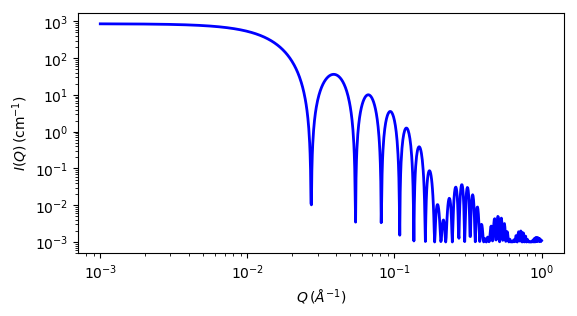vesicle
Vesicle model representing a hollow sphere
Parameter |
Description |
Units |
Default value |
|---|---|---|---|
scale |
Scale factor or Volume fraction |
None |
1 |
background |
Source background |
cm-1 |
0.001 |
sld |
vesicle shell scattering length density |
10-6Å-2 |
0.5 |
sld_solvent |
solvent scattering length density |
10-6Å-2 |
6.36 |
volfraction |
volume fraction of shell |
None |
0.05 |
radius |
vesicle core radius |
Å |
100 |
thickness |
vesicle shell thickness |
Å |
30 |
The returned value is scaled to units of cm-1 sr-1, absolute scale.
Definition
This model provides the form factor, P(q), for an unilamellar vesicle and is effectively identical to the hollow sphere reparameterized to be more intuitive for a vesicle and normalizing the form factor by the volume of the shell. The 1D scattering intensity is calculated in the following way [1]:
where ϕ is the volume fraction of shell material, Vshell is the volume of the shell, Vcor is the volume of the core, Vtot is the total volume, Rcore is the radius of the core, Rtot is the outer radius of the shell, ρsolvent is the scattering length density of the solvent (which is the same as for the core in this case), ρscale is the scattering length density of the shell, background is a flat background level (due for example to incoherent scattering in the case of neutrons), and j1 is the spherical Bessel function j1=(sin(x)−xcos(x))/x2.
The functional form is identical to a “typical” core-shell structure, except that the scattering is normalized by the volume that is contributing to the scattering, namely the volume of the shell alone, the scattering length density of the core is fixed the same as that of the solvent, the scale factor when the data are on an absolute scale is equivalent to the volume fraction of material in the shell rather than the entire core+shell sphere, and the parameterization is done in terms of the core radius = Rcore and the shell thickness = Rtot−Rcore.

Fig. 95 Vesicle geometry.
The 2D scattering intensity is the same as P(q) above, regardless of the orientation of the q vector which is defined as
NB: The outer most radius (= radius + thickness) is used as the effective radius for S(Q) when P(Q) * S(Q) is applied.

Fig. 96 1D plot corresponding to the default parameters of the model.
Source
vesicle.py
⋆ vesicle.c
⋆ sas_3j1x_x.c
References
Authorship and Verification
Author: NIST IGOR/DANSE Date: pre 2010
Last Modified by: Paul Butler Date: March 20, 2016
Last Reviewed by: Paul Butler Date: September 7, 2018